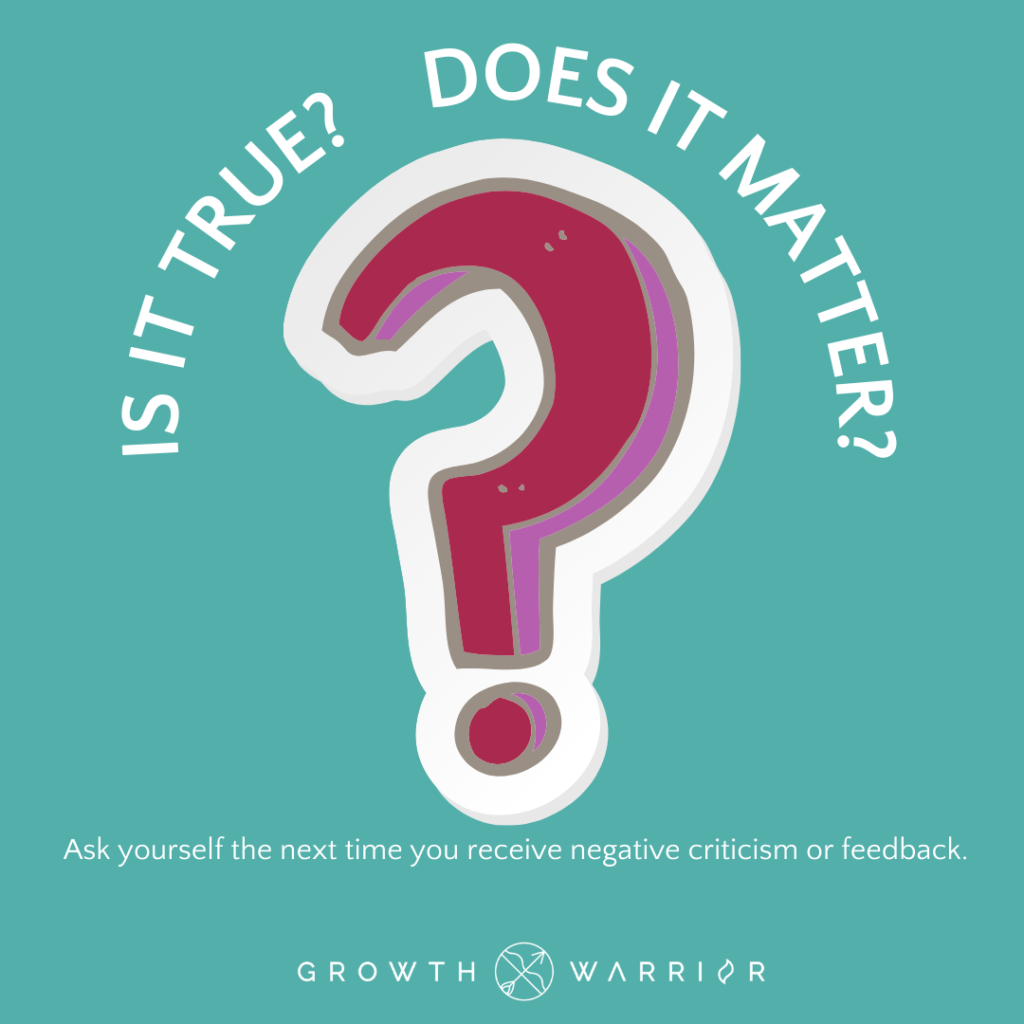How do we find the truth?
Have you ever gotten side-swiped by someone telling you something unexpected at the least opportune time? You know, like during your annual performance review when your boss trots out some criticism of something that happened 8 months ago. When one friend tells you something you did to hurt another friend you weren’t aware of. Or when a sibling reminds you of that time you embarrassed yourself or brings up something you struggle with and it touches a nerve. Ouch!
I was reflecting on years of feedback at work and messages like:
- You’re not assertive enough (particularly if you’re a woman)
- You’re too assertive (for women again)
- You’re not driving change
- You’re pushing too much change (but they don’t say: it’s making us uncomfortable)
- You don’t seem to know your numbers
- You’re too focused on the numbers and not connecting with your message
- You’re too (insert whatever critical comments you received) …..
So which is it? Too much or too little? D more or do less? The underlying implication for all of these is that you are “not enough” or “too much”, neither of which implies wholeness or being fine exactly the way you are. It can be confusing and exhausting to interpret what someone is saying, let alone what’s not being said.
Sadly, I’ve been on both sides of these criticisms, sometimes giving the feedback and other times receiving it. We often can benefit from someone sharing a perspective we hadn’t considered or bringing attention to our blind spots so we can be better in the future. Though we often don’t receive criticism that could be constructive, we can get beaten up by someone else’s reaction that gets directed at us.
The real message is often, you’re making me (the boss, friend, sibling) uncomfortable, so I’m going to project my sh*t onto you and blame you. Often, this happens when pressure reaches a breaking point or frustration built up over time boils over and now they’re going to let you have it so you can know, improve your ways, be better or change. It’s all on you!
Now don’t get me wrong, many criticisms often hold a grain of truth and we are wise to listen to any feedback that can be helpful. To hear what is being said, then to place it in the proper context and assess what we want to do with the information. How “truthful” and important is it for us to address vs. what does it actually reflect about the person giving us the feedback and their needs? What may be true is they want something from us, but that doesn’t mean that we need to assume we are at fault or wrong or lacking in some way.
THE HIDDEN MESSAGES
There is so much that is said without words, using body language or tone to convey a message. These clues can often tell us more about what’s really going on. Can we listen for what’s not being said or which information is being withheld? When was the message delivered and why? Often, criticism is difficult to share because it can be negative or possibly shaming. While the person sharing doesn’t want to offend, they are still judging you on this thing regardless. How can we uncover what’s really going on?
Here are some approaches to consider:
- NOTICE: See what’s going on with your dynamics. Reading the room (both in person and virtually) is an incredibly valuable skill. It is an effective way to gauge how to moderate your approach based on what you’re noticing in your audience. Pay attention to those around you. Are they receptive or distracted? Is the energy in the room heavy or light? If you sense a reaction to something you’ve said or done that wasn’t what you anticipated, make a mental note and be curious. “Huh? That didn’t go over the way I planned, I wonder why? Was it me? Was it them?” As you reflect and deconstruct, try not to take things too personally.
- PREPARE: Do your homework and consider what might happen. How do you want to feel? How do you want to impact others? Why? Consider your intention. When were you upset, surprised or disappointed about criticism you received? What might you do differently? Did you feel it was true or not? Of course we can try to dismiss hurtful comments, but we also need to consider why they hurt and whether there is anything valuable we need to learn. Perhaps we choose to counter and address criticism or recognize we can’t change the other person’s mind, but we can set clear boundaries and choose how we want to react.
- TIMING: There is a time and a place for everything, so try to find the best time to connect. While we can’t control all aspects of every situation, we can be thoughtful to create more optimal timing when possible. Directly after a fight or stressful situation is less ideal than perhaps late morning or early afternoon when someone is caffeinated and well fed and able to give you their full attention. Proximity to the event keeps it relevant. I always tell clients who want to get promoted or who have challenging relationships with their boss to understand their company’s review cycle. You don’t want to have a difficult discussion before salary increases and at the same time you wouldn’t want to miss the opportunity to rectify something before a decision has already been made.
- CONTEXT: Be thoughtful and consider the circumstances. Keep in mind that multiple factors can impact our interactions having to do with us, them, the timing, the topic, the mood, etc.. You get the idea. Analyze what was going on at the time and consider different variables to see if changing one or two of them might have produced a different outcome. Assess what is within your control (see timing above), then you look to shift the dynamic next time.
- ASK: You could directly solicit input on something you are curious about. Consider doing this close to the event so the person remembers the situation and can tell you what they were thinking and why. This is a powerful way to get more information, so you don’t need jump to assumptions about their reasoning. You can hear it from the horse’s mouth. And then of course you can decide whether you agree or not and how to respond.
Most people don’t like giving feedback. We don’t like conflict. Not all of us are taught how to let others know when we didn’t appreciate something in a nice, helpful or thoughtful way. Instead, we typically resort to less than admirable behaviors like talking about them behind their back, blaming them for making us feel weird or criticizing them to make ourselves feel better. Anything but face them directly to clear the air. And it doesn’t need to be that way!
One client had worked herself into a froth after her annual review when she receiveda letter from HR with a much lower annual increase than anticipated when she thought she was getting promoted. She spent weeks stewing until we prepared her to discuss the situation with her boss. Well, it turned out HR made a typo and sent out the wrong information. Imagine her relief when she discovered it was just a mistake, and then her aggravation that she had spent so much time and energy being needlessly stressed.
When we’re unsure about something, but are feeling uncomfortable, there’s an opportunity to check in and understand what’s really going on. Before we create a story. How are you feeling? Why? Recognize how much of this is really about you or is it about them.
Remember it’s not uncommon for others to project their stuff onto us just because they can’t deal with their own issues. That doesn’t mean it’s true. It also doesn’t mean that what they’ve said is invalid or completely without merit. The key is figuring out your truth in all of it. What is important and what matters to you?
If giving and receiving feedback brings up some stuff for you, know that is a natural reaction. Interested in exploring how to feel more calm, confident and effective in communicating with others? Let’s talk about it! Schedule a Discovery Call here to explore. Looking forward to catching up.
Related Posts



